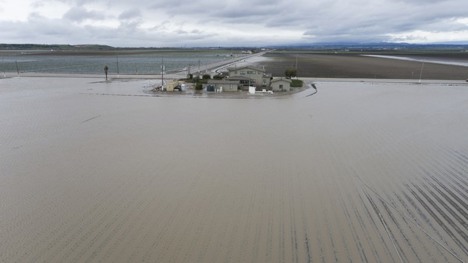South Dakota farmers have received nearly $10 billion in payouts from the Federal Crop Insurance Corp. over roughly the past two decades, with payments specifically due to weather disasters rising significantly during that time.
Between 2001 and 2022, South Dakota was among the top states in the nation for receiving insurance payouts for crop losses due to weather disasters, a trend environmentalists have said reveals a hidden but rapidly rising cost of climate change that is increasing the frequency and severity of storms that damage crops.
Of the $9.6 billion sent to state farmers and ranchers in that time frame, more than $8.3 billion was claimed for weather-related losses due to excess moisture, drought, hail, wind or freezing temperatures, according to a new analysis by the nonprofit Environmental Working Group (EWG). The rest was for losses not related to weather.
Farmers who buy crop insurance can receive settlements anytime their crops are damaged or destroyed or when they are unable to plant, thereby eliminating anticipated income.
American taxpayers have funded a large portion of the payouts, as nearly 65% of the premiums for the crop insurance program run by the U.S. Department of Agriculture are subsidized with federal funding.
The Congressional Budget Office estimates the crop insurance program will cost taxpayers $16.3 billion in fiscal year 2023 when average U.S. farm incomes are at or near record highs. American farmers overall received $19.1 billion in crop insurance payouts in 2022, a record and far above the $3 billion paid out in 2002, according to EWG.
Critics of the USDA program have said the crop insurance program needs reforms to reduce taxpayer support. That would increase transparency in regard to flow of funds and encourage farmers to make their operations more resilient against the long-term effects of climate change, they have said.
Renewal of the crop insurance program is part of the 2023 Farm Bill now under consideration by the U.S. Congress.
Anne Schechinger, Midwest director for EWG, said there is a strong correlation between rising crop insurance payouts and climate change.
"We know that these payments will keep going up, and that the program is going to be more and more expensive for taxpayers and farmers as this extreme weather gets worse," Schechinger said in an interview with News Watch.
"We’re very confident there’s a strong connection to climate change here because farms are some of the businesses most vulnerable to climate change."
While the USDA oversees the program, the insurance policies are sold and managed by private companies.
A previous analysis by the EWG found that a third of all crop insurance payout funds – about $33 billion over the past 10 years – have been absorbed by the dozen or so big insurance companies and their agents that sell policies and not to farmers who work the land and absorb the risk.
"The reality is that not that many U.S. farmers benefit from these programs and that the money is mostly going to these larger and wealthier farmers," Schechinger said. "And the insurers are definitely making billions of dollars every year."
Over the 22-year period examined by EWG, South Dakota farmers received the third-most payments among all states for losses due to drought ($4.1 billion) and excess moisture ($3.3 billion), and the sixth-most payments for hail damage ($620 million).
Though claim amounts varied by year and weather conditions, the overall payments to South Dakota farmers for crop losses have risen steadily over the past two decades, with sharp increases shown in the past decade: $180 million paid out in 2014, $188 million in 2015 and $1.3 billion in 2022.
Despite the rising costs and payouts, however, South Dakota Farm Bureau Federation president Scott VanderWal said the crop insurance program remains a critical component of the economic equation that allows agricultural producers to remain in business.
"It’s so vitally important for the ability of farmers and ranchers to manage their risk," said VanderWal, who also serves as vice president of the American Farm Bureau, which is a certified agency allowed to sell crop insurance. "When you’re so totally depending on the weather for your livelihood, you have to be able to manage that risk."
VanderWal said the program has saved family farms in South Dakota from financial devastation numerous times, most recently in 2019 when extreme wet weather prevented many row crop farmers from even planting a crop. USDA data show that South Dakota farmers received nearly $1 billion in crop insurance payments solely due to flooding that year.
"I can tell you that if we have a crop insurance indemnity on a field, we don’t make any money on it. It just lessens the pain and keeps you in business for the next year."
VanderWal said taxpayer subsidization of the program is important to ensure that American farmers can stay in business.
"That’s the investment the American public is making to ensure that the industry that raises our food, fiber and fuel remains viable and strong so we don’t find ourselves depending on other countries for our food like we do for energy a lot of the time," he said.
"Because we can feed ourselves we don’t have to worry about getting our food from other countries. That’s so incredibly important and part of our national security."
Beyond individual losses caused by extreme weather, crop insurance protects entire communities that rely on farm-related spending, said Jerry Schmitz, executive director of the South Dakota Soybean Association.
"If these folks have a tremendous loss, and they aren't able to pay their bills, the grocery stores, seed stores and other local business suffer, too," Schmitz said.
Schmitz also said the crop insurance program is critical for young farmers, who will form the future of agriculture in America.
"For a young person coming in, with the debt they’ve acquired just to get into the business and suddenly they have a loss of income, it’s pretty impactful."
Source - https://www.agweek.com













